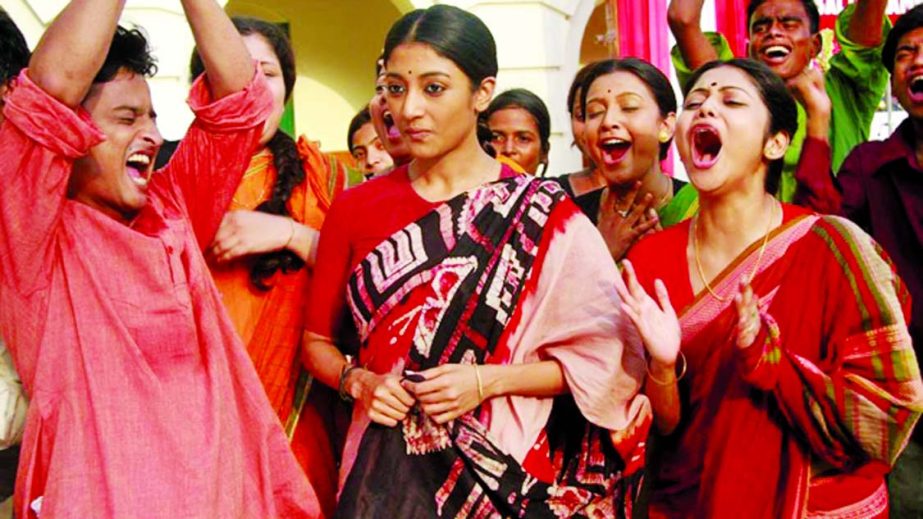
Entertainment Desk :
Kheya’s body is recovered from the Hooghly, leading to a series of protests by theatre lovers in Kolkata. Did the actress willingly jump off the launch while acting the part of a blind mother, was it murder or just another accident? Truth must be told. Kolkata Port Police begins a probe that throws light on the actress and her life on stage.
She died young. And sank without a trace from public memory. If not for Natoker Moto, Keya Chakraborty may have been carried away by a buoyant tide to anonymity. This was a distinct possibility. But like a mystery that she was in life, the lioness on stage, who met with a tragic ending, continues to haunt, even in death. Suddenly, she is everywhere. Two of this week’s plays – Sher Afgaaner Tiner Talowar and Nandikar’s Bhalomanush, based on Brecht’s The Good Woman of Setzuan, where a young Sohini Sengupta led from the front – mentioned Keya in passing, during and before the performances. And then, there’s a Friday throwback to the past.
Those not in the know, in March 1977 Keya, 34, a popular theatre actress, lost her life reportedly by drowning near Sankrail during the shoot of Swadesh Sarkar’s Jeevan Jey Rokom. The circumstances were mysterious and the versions of eyewitnesses, bystanders and acquaintances varied. While that was the end of a young dream, it is the starting point of Debesh Chattopadhyay’s film. And like in real life, Kolkata Port Police takes charge soon after. Through interactions with characters surrounding Kheya (Paoli), Bhobodulal Roy (Rajatava Dutta) pieces together events and in the process, uncovers facts piecemeal. What is unveiled is the journey of a lone woman and her fight for love. Kheya says her only love is theatre, though she falls for Prosad (Saswata Chatterjee), her college senior, early in life. Their meeting scene at the football ground coupled with an ebullient song, Pashapashi hete jete jete, is one of the best moments in the film.
Natoker Moto also touches upon Kheya’s bonding with Amitesh (Bratya Basu), her mentor in the theatre group Notokar, Monoranjan (Sujan Mukherjee), her professor, and throws up a few pertinent questions on love and relationships. But beyond the physical manifestations of love – she cooks and cleans for Prosad, leaves her job when Amitesh suggests theatre needs full-time involvement and takes money unhesitatingly from Monoranjan for her mother’s treatment – there is the call of the unrequited… Knowing well that theatre would take from her more than it would ever give, Kheya gives everything to it. Paoli internalises Kheya and surrenders completely to what the role demands. Even in the in-film plays like Antigone, Noti Binodini, Proposal, she shines – like a star would from a distant horizon and another era. She shows her mettle even while singing Ami jokhon meye thaki, a fresh new composition by Debajyoti Mishra for Bhalomanush and leaves us wondering if Kheya and Keya are indeed one.
Kheya’s body is recovered from the Hooghly, leading to a series of protests by theatre lovers in Kolkata. Did the actress willingly jump off the launch while acting the part of a blind mother, was it murder or just another accident? Truth must be told. Kolkata Port Police begins a probe that throws light on the actress and her life on stage.
She died young. And sank without a trace from public memory. If not for Natoker Moto, Keya Chakraborty may have been carried away by a buoyant tide to anonymity. This was a distinct possibility. But like a mystery that she was in life, the lioness on stage, who met with a tragic ending, continues to haunt, even in death. Suddenly, she is everywhere. Two of this week’s plays – Sher Afgaaner Tiner Talowar and Nandikar’s Bhalomanush, based on Brecht’s The Good Woman of Setzuan, where a young Sohini Sengupta led from the front – mentioned Keya in passing, during and before the performances. And then, there’s a Friday throwback to the past.
Those not in the know, in March 1977 Keya, 34, a popular theatre actress, lost her life reportedly by drowning near Sankrail during the shoot of Swadesh Sarkar’s Jeevan Jey Rokom. The circumstances were mysterious and the versions of eyewitnesses, bystanders and acquaintances varied. While that was the end of a young dream, it is the starting point of Debesh Chattopadhyay’s film. And like in real life, Kolkata Port Police takes charge soon after. Through interactions with characters surrounding Kheya (Paoli), Bhobodulal Roy (Rajatava Dutta) pieces together events and in the process, uncovers facts piecemeal. What is unveiled is the journey of a lone woman and her fight for love. Kheya says her only love is theatre, though she falls for Prosad (Saswata Chatterjee), her college senior, early in life. Their meeting scene at the football ground coupled with an ebullient song, Pashapashi hete jete jete, is one of the best moments in the film.
Natoker Moto also touches upon Kheya’s bonding with Amitesh (Bratya Basu), her mentor in the theatre group Notokar, Monoranjan (Sujan Mukherjee), her professor, and throws up a few pertinent questions on love and relationships. But beyond the physical manifestations of love – she cooks and cleans for Prosad, leaves her job when Amitesh suggests theatre needs full-time involvement and takes money unhesitatingly from Monoranjan for her mother’s treatment – there is the call of the unrequited… Knowing well that theatre would take from her more than it would ever give, Kheya gives everything to it. Paoli internalises Kheya and surrenders completely to what the role demands. Even in the in-film plays like Antigone, Noti Binodini, Proposal, she shines – like a star would from a distant horizon and another era. She shows her mettle even while singing Ami jokhon meye thaki, a fresh new composition by Debajyoti Mishra for Bhalomanush and leaves us wondering if Kheya and Keya are indeed one.

